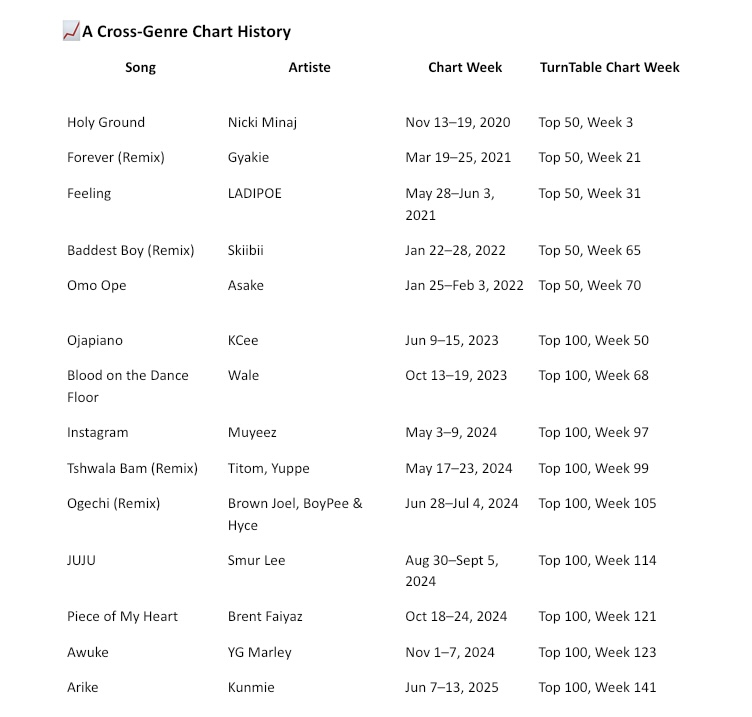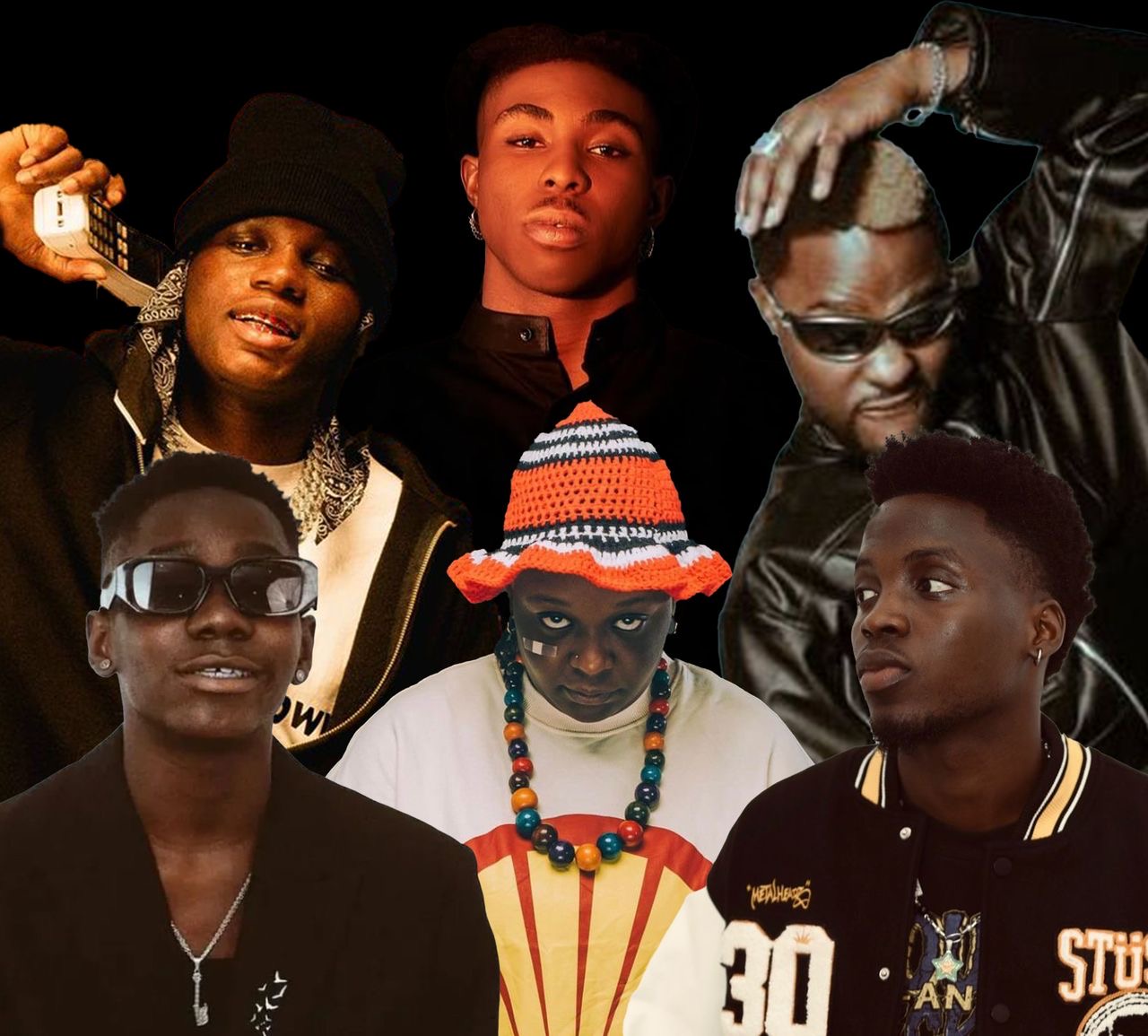Since launching in 2020, TurnTable Charts has become the gold standard for tracking music consumption in Nigeria.
In a market where the intersection between streaming, social media, and virality is at an all-time high, TurnTable’s data-driven insights provides invaluable real-time reflection of what the Nigerian public is listening to.
If virality and a plethora of countless hits are evidence of Afrobeats dominance in Nigeria before the availability of consumer data, the data assures us of this continuous domination.
However, a closer look at recent chart-toppers tells a different story.
From “Holy Ground,” Davido and Nicki Minaj’s electrifying chart topping debut in 2020, to Kunmie’s TikTok propelled hit “Arike” in 2025, the charts have begun to reveal a subtle but significant shift.
Today, the Nigerian audience is more open, global, and driven by discovery than ever before.
An examination of these 14 chart toppers over the past years reveals a common denominator. These songs are united not by sound, but by momentum.
They are testament to an evolving landscape where genre boundaries are blurred, and where new voices are sharing the podium with household names.

Nicki Minaj on “Holy Ground,” Wale on “BLOOD ON THE DANCE FLOOR,” Brent Faiyaz on “Piece of My Heart” and YG Marley on “Awuke,” are interesting occasions of international superstars earning a No. 1 single in Nigeria with their first chart entry. However, they all have one thing in common – assist from a mainstream Nigerian artiste; Davido for Nicki Minaj & YG Marley, ODUMODUBLVCK for Wale and Wizkid for Brent Faiyaz.
Legacy acts Ladipoe, Skiibii and Kcee earned their first No. 1 singles with their first chart entry in 2021, 2022 and 2023 respectively. Ladipoe, a popular name in Nigerian hip hop, has flirted with mainstream success before “Feeling.” During the pandemic, the rapper teamed up with Simi for “KNOW YOU” which became one of the most popular songs during the lock down.
However, its period of popularity preceded the inception of aggregated singles chart in Nigeria. In the case of Ladipoe, it was for the song “Feeling” which ended up propelling the career of another emerging artiste BNXN fka Buju (BNXN had one entry on the official singles chart before “Feeling,” which was “So Lovely”).
Skiibii scored one of the biggest songs of the year with “Baddest Boy (Remix)” featuring Davido. While he hasn’t quite hit those heights before and after the song, “Baddest Boy” and its remix served as a statement for one of Nigeria’s most endearing artistes from the blog era.
Before the debut of “Ojapiano” and its eventual rise to the summit of the Nigeria Top 100, Kcee dabbled primarily in non-mainstream genres with the release of his ‘Cultural Praise’ series EPs with the Okwesili Eze Group. The collection of projects earned him the title of No. 1 Gospel Artiste on the 2021 Year-End Charts but none of the tracks were popular enough to appear on the weekly singles chart. With “Ojapiano,” he maintained his propensity for fusing indigenous Igbo music with pop sound and the result was a Jay Synths-assisted rich blend of the era-defining Amapiano sound with the Igbo Oja flute.
With the removal of these international and legacy acts– this leaves Gyakie, Asake, Muyeez, TitoM, Yuppe, Brown Joel, Hyce, BoyPee, Smur Lee and Kunmie for consideration.
Now, we have a clearer trend. More emerging artistes are scoring No. 1 hits with their first chart entry than ever before. Between December 2020 and December 2023, only two songs by artistes appearing on the official singles chart reached No. 1– Gyakie with “Forever (Remix)” assisted by Omah Lay in March 2021 and Asake with “Omo Ope” featuring Olamide in February 2022.
Since the start of January 2024, this has happened five times culminating in the current No. 1 song in the country, “Arike” by Kunmie. First time entry on the official singles chart. Check. No assist from a mainstream chart-topping artiste. Check. Fan-led Tik-Tok algorithmic-assisted hit. Check.
What’s clear across these entries is a pivot away from predictability. From the energetic log drums of “Tshwala Bam (Remix)” to the highlife-laced melodies of “Ogechi,” and the lo-fi tenderness of “Arike,” Nigerian audiences are tuning in to music that feels fresh, innovative, and platform-native — often first discovered on TikTok, Audiomack, or streaming playlists rather than traditional radio.
Outside the No. 1 hits, a number of first-timers have peaked in the top 5 in recent months, even going on to bigger heights since their initial entry. Fido’s “Awolowo” peaked at No. 2 on the Official Nigeria Top 100 — this was the artiste’s first visit to the official singles chart. He went a rung further with his second entry on the chart “Joy Is Coming” which ruled the charts in the early months of 2025. As of today, it is the biggest song in Nigeria so far this year.
Another example is FOLA’s “alone” with BhadBoi OML (later “alone [Remix] with BNXN) peaked at No. 4 on the official singles chart. The RnB artiste then spurned an even bigger hit with a track of his first project; “who does that?” featuring Bella Shmurda, which peaked at No. 2 on the chart. Today, he occupies the No. 2 spot on the Official Nigeria Top 100 with another entry – this time as a featured act on Zlatan’s “Get Better.”
🎧 The Rise of the Fan-Curator Era
The gatekeepers are no longer just the Media, DJs, OAPs, or record labels — they’re also the fans. “Arike,” for instance, wasn’t powered by a big-name feature or major label push. Instead, it grew organically through short-form video, peer-to-peer sharing, and the emotional resonance it sparked in listeners.
Likewise, “Instagram” by Muyeez thrived on relatability, while “Tshwala Bam” leveraged global appeal with diasporic ties.
What ties all of these records together isn’t a genre — it’s its infectious energy that thrives in its diversity, authenticity, timing, and fortune.
🔍 A New Kind of Data-Driven Storytelling
TurnTable’s methodology, which is a hybrid of streaming, radio airplay, and video consumption metrics, has made these shifts visible in real time.
Five years ago, these songs may have been dismissed as anomalies. Today, they are signposts of a broader evolution: one where sub-genres like Street-hop, Afro-fusion, Amapiano, and Alté aren’t just niche sound. They now impact the wider market.
“What we’re seeing isn’t just diversification,” says a TurnTable Charts rep. “It’s the democratization of taste. Audiences now decide what matters.”
🌍 A Future That Belongs to the Unconventional
This isn’t a genre revolution. It’s a listener evolution. The new generation of Nigerian listeners aren’t just consuming music. They are shaping, curating, and pushing it into new territories. In this new era, the charts aren’t just measuring success. They are documenting cultural shifts.
So as TurnTable Charts turns the page on its fifth year, one thing is clear: the future of Nigerian music belongs to the bold, the innovative, and the next wave of sonic adventurers.
